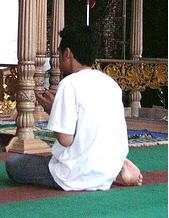 By Omar Sacirbey,
By Omar Sacirbey,
Religion News Service
(RNS) “Talk with as many people as you can. Talk vertically, talk laterally.” That’s the advice of the Rev. Welton Gaddy, president of the Interfaith Alliance, for attendees of the US-Islamic World Forum in Doha, Qatar.Gaddy went to last year’s forum,which drew big names like former Secretary of State Madeleine Albright, U.S. Army Gen. David Petraeus, and dozens of religious leaders, military officers, politicians, journalists, technology experts.“It helped put a face and identity and personality on a people that we only see in media portrayals,” Gaddy said.
Secretary of State Hillary Rodham Clinton is among those expected to attend this year’s forum—the seventh annual—which is scheduled for Feb. 13-15 and sponsored by the Brookings Institution. The summit comes at a sensitive time in U.S.-Muslim relations. Following the attempted Christmas Day airliner bombing and other recent terror-related arrests, many Americans are increasingly worried about terrorism, and critics are accusing President Obama of being soft on Muslim extremists.
In the Muslim world, many people are angry about the war in Afghanistan, U.S. drone attacks in Pakistan, the Israeli-Palestinian conflict, their own economic problems, and expect Obama to deliver remedies faster than his administration may be able to.
“All of us know that the standing that the United States has with young people in the Muslim world is quite negative,” said Episcopal Bishop JohnChane of Washington D.C., who has attended two previous forums. “The U.S. has such a checkered past in international relations.”
The sensitive state of U.S.-Islamic relations requires increased religious involvement in American diplomacy, argued Chane and other U.S. religious figures going to this year’s conference.
“When you have 1.5 billion Muslims, 2 billion Christians, and 13 million Jews, from an Abrahamic perspective, you have a lot of influence,” said Chane. “Twentieth-century diplomacy has failed so far, and we have to recognize that you need religion in the mix.”
Pastor Joel Hunter of Northland Church in Florida, who is going to his third forum this year, agreed. “In the Muslim world, that’s not the way they do things. Their faith is a very integral part of their foreign policy. They want to hear secular and religious ideas,” he said.
Despite current tensions, observers say U.S.-Islamic relations under Obama are much improved from the Bush administration.
“A lot of the Islamic world is more anxious to engage because we have a president who wants to restart relations with Muslims,” said Hunter. “We’ve gone from a defensive mode to a development and diplomatic mode.”
Al-Husein Madhany, a Muslim-American scholar and technology activist who will be convening a conference workshop on how to use new media to build grassroots organizations and civic institutions, agreed.
“We have a moment in history where there’s been a promise made by the leader of the free world for a new beginning,” he said. “There’s an excitement in people’s voices about America that I didn’t hear during the previous administration.”
But after six forums, there are some skeptics who wonder whether such conferences can achieve anything substantive.
“During the Bush administration, they were eye-openers because the Bush administration had a narrow view of the Muslim world. But the new administration is open to a more complex view of the Muslim world. I don’t know what these people can do at this point,” said Muqtedar Khan, director of the Islamic studies program at the University of Delaware.
“There have been many conferences, but nothing came out in terms of security,” added Khan, who has attended earlier Doha forums, but is not going this year.
Disclaimer: Articles featured on Oregon Report are the creation, responsibility and opinion of the authoring individual or organization which is featured at the top of every article.

